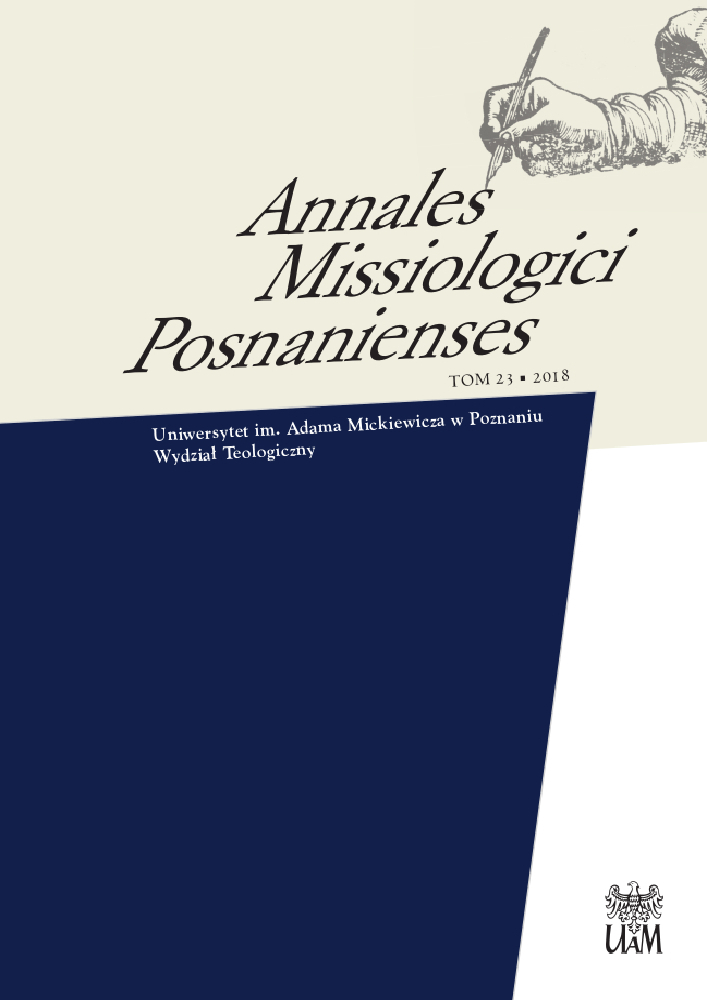Abstract
The proclamation of the Gospel as Good news for all men has always been at the heart of the life of the mission of the Church. This is why the new evangelization in no way modifies the content of the Gospel, the message of salvation brought by Christ. But in the current global context, it is made ever more urgent and necessary. Faced with all these new phenomena that permeate the contemporary world and the Church, renewed enthusiasm and enthusiasm is needed to respond to the urgency and the need for a new evangelization. This inner impulse can only be the result of a rich and singular personal spirituality, without which the evangelizer runs the risk of quickly becoming exhausted or discouraged: Missionary activity requires a specific spirituality which concerns in particular those whom God has called missionaries (RMis 87). This specific spirituality is nourished by the meditation of Christ the Savior - the Word of God. Through this meditation, the new evangelizers experience being healed by God through Jesus Christ. The encounter with the living God is an entirely original, transformative experience that puts everything in its place and completely upsets reality. This results in the ardor of evangelization that is constantly renewed. All evangelization requires from those who announce, a testimony of life that attests to the truth and the reality of the Gospel. To give one's testimony on mission is to give an account of what we have lived, seen and heard, and meditation is a good way to carry out this reality. Evangelization has a mystical origin; it is a gift that comes from the cross of Christ the Savior. That is why Christian meditation rooted in the tradition of the Church - especially in the Gospel - is a means for the new evangelization.
References
Aparecida. V Ogólna Konferencja Episkopatów Ameryki Łacińskiej i Karaibów. Dokument końcowy: Jesteśmy uczniami Chrystusa, aby nasze narody miały w Nim życie. Gubin 2014.
Benedykt XVI. „Homilia na zakończenie Synodu na temat Eucharystii w życiu i misji Kościoła”, 26 października 2008 (opublikowano 26 października 2008). Dostęp 3 listopada 2014. http://www.vatican.va/holy_father/benedict_xvi/homilies/2008/documents/hf_ben- xvi_hom_20081026_conclusione-sinodo_fr.html
Benedykt XVI. „Homilia podczas I Nieszporów Uroczystości św. Piotra i Pawła” (opublikowano 28 czerwca 2010). Dostęp 10 września 2014. http://www.vatican.va/holy_father/benedict_xvi/homilies/2010/documents/hf_ben- xvi_hom_20100628_vespri-pietro-paolo_fr.html
Benedyktyni. Dostęp 26 września 2014. http://www.benedyktyni.net/node/26
Enomiya-Lassalle, Hugo Makibi. Medytacja zen dla chrześcijan. Tłum. Tadeusz Zatorski. Kraków: WAM 2010.
Giovanni Paolo II. “Discorso alla Chiesa italiana per la celebrazione delle III Convegno ecclesiale a Palermo” (opublikowano 23 listopada 1995). Dostęp 8 listopada 2014. http://www.vatican.va/holy_father/john_paul_ii/speeches/1995/november/documents/hf_jp- ii_spe_19951123_palermo_it.html
Griffiths, Bede. Złota nić. Tłum. Janina Mroczkowska. Kraków: Znak, 1974.
Jan Paweł II. „Duch Święty nadrzędnym podmiotem ewangelizacji. Audiencja generalna 1 lipca 1998 r.” (opublikowano 22 kwietnia 1999). Dostęp 8 listopada 2014. http://www.opoka.org.pl/biblioteka/W/WP/jan_pawel_ii/audiencje/ag_01071998.html#
Jan Paweł II. „Homilia w czasie Mszy Świętej kanonizacyjnej błogosławionego Jana z Dukli.” Jan Paweł II w Polsce: 31 maja 1997 – 10 czerwca 1997. Przemówienia i homilie. Kraków: Znak, 1997.
Macchioni, Giuseppe. Evangéliser en paroisse. L’expérience des cellules paroissiales d’évangélisation. Nouan-le-Fuzelier: Pneumathèque EdB, 2009.
Merton, Thomas. Księga godzin. Tłum. Tomasz Dzikowski. Kraków: Homini, 2009.
Piasecki, Piotr. Duchowość misyjna w posoborowej nauce Kościoła katolickiego. Poznań: RW WT UAM, 2013.
Ratzinger, Joseph. Sól ziemi: chrześcijaństwo i Kościół katolicki na przełomie tysiącleci: z kardynałem rozmawia Peter Seewald. Tłum. Grzegorz Sowiński. Kraków: Znak, 1997.
Synod Biskupów, XIII Zwyczajne Zgromadzenie Ogólne. Nowa ewangelizacja dla przekazu wiary chrześcijańskiej. Lineamenta nr 13 (opublikowano 2011). Dostęp 3 listopada 2014. http://www.vatican.va/roman_curia/synod/documents/rc_synod_doc_20110202_lineam enta-xiii-assembly_pl.html#_ftn43>
License
Copyright (c) 2019 Piotr Piasecki

This work is licensed under a Creative Commons Attribution-NoDerivatives 4.0 International License.
PUBLISHED WORK ARE LICENSED UNDER A CREATIVE COMMONS:
Before 2006 all published texts are copyrighted.
Authors
Authors of texts accepted for publication in the journal Annales Missiologici Posnanienses are required to complete, sign and return to the editorial address an agreement to grant free license to works, with an obligation to grant CC sublicense.
According to the agreement, the authors of the texts published in the journal Annales Missiologici Posnanienses grant to Adam Mickiewicz University in Poznan a non-exclusive and royalty-free licencji Creative Commons Attribution-NonCommercial-NoDerivatives 4.0 International (CC BY-NC-ND 4.0) license and allow sublicensing under the same conditions.
The authors retain the rights to further freely dispose of the work.
Users
Interested internet users are entitled to use works published from 2021 onwards in Annales Missiologici Posnanienses under the following conditions:
- Attribution - the obligation to provide with the distributed work, information, about the authorship, title, source (links to the original work, DOI) and the license itself;
- Non-commercial use - you should not use the work for commercial purposes;
- Without creating derivative works - the work must be preserved in its original form, e.g. translations, adaptations may not be distributed without the author's permission.
Interested Internet users are entitled to use works published between 2006 and 2020 in Annales Missiologici Posnanienses under the following conditions:
- acknowledgment of authorship - the obligation to provide with the distributed work, information, about the authorship, title, source (links to the original work, DOI) and the license itself;
- without creating derivative works - the work must be preserved in its original form, e.g. translations, adaptations cannot be distributed without the author's consent.
Other
Adam Mickiewicz University of Poznan retains the right to the journal as a whole (layout, graphic form, title, cover design, logo, etc.).


